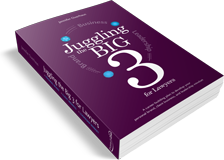Brand
Business
Leadership

“This book tells you all you need to know about how to get on.” The Times
“Relatively few books have been written with assistant solicitors in mind, about how to succeed at the business of being a lawyer… fewer still have devised a programme for so doing that runs alongside a book. This book does both.”Law Society (The Law Management Section)
5 star rating HR Magazine
 There are a lot of good books out there for learning how to network, build client relationships, and market one's self. And I’ve read most of them. But very very few of these books are specific to us lawyers—which is one of the reasons I wrote Juggling the Big 3.
There are a lot of good books out there for learning how to network, build client relationships, and market one's self. And I’ve read most of them. But very very few of these books are specific to us lawyers—which is one of the reasons I wrote Juggling the Big 3.
As a lawyer, we tend to feel as though we work within an idiosyncratic profession—we are valued and rewarded for our intellect—and not cut from the same cloth as, for example, management consultants and sales people. (Did I actually use that four-letter word “sell” in the same sentence as “lawyer”?) Further, lawyers (at least in private practice) work on the basis of billable hours, which means time spent on “other” endeavors can feel like time wasted… and only fellow lawyers (who understand this difficulty) can advise on how to “juggle” networking and marketing with the unique demands of a legal career.
This may be true, but it doesn’t mean that lawyers can’t (or shouldn’t) be following the advice of other successful professionals.
One UK firm that specializes in marketing for lawyers (Berners Marketing) agrees. In fact, they specifically recommend the following books (written by non-lawyers):
Rainmaking Made Simple What Every Professional Must Know by Mark M. Maraia;
The Trusted Adviser by David H. Maister, Robert Galford, Charles Green;
Network Your Way to Success by John Timperley; and
Business Stripped Bare by Richard Branson.
I’ve read them all, and each of them was both beneficial to me as a practicing lawyer, and as an author.
Oh, and by the way, Berners Marketing also recommend Juggling the Big 3…which, IS, written by a lawyer, for lawyers.
Posted on 25/01/2010
 Okay, so you know what your goals are…but do you know what they look like? i.e. can you visualize yourself having achieved them? If not, I urge you to think about it, and answer these questions:
Okay, so you know what your goals are…but do you know what they look like? i.e. can you visualize yourself having achieved them? If not, I urge you to think about it, and answer these questions:
How do you see yourself in the “picture of your success”?
Where are you?
What are you doing?
Who are you with? How do you look?
Give yourself a clear picture of the situation. Be specific.
Also, experience your success. How do you feel having achieved your goals? Confident? Happy? Fulfilled?
Put all of this together in a simple statement. For example, “I have achieved X. I am in my large corner office overlooking the river, while wearing a designer suit and Jimmy Choo shoes. I feel the way I did in high school the day I heard I’d made valedictorian!”
“Why all the detail?” I hear you ask. Well, for two reasons. First, if you make yourself visualize your goal, it forces you to focus on what you really want. You might want a nice house (OK, right, who doesn’t?), but what sort of house? Where is it? What does it look like? Doing this exercise can be eye-opening. One young lawyer I mentored was feeling uncertain, so I asked her what her goal was. “To make partner, of course,” she replied. However, when I asked her to do this exercise, she realized that she had never really thought about the details of her goals—or (worse still) about what achieving them would really mean to her. The exercise made her recognize that she did indeed want to achieve partnership—but at a very different type of firm.
Second, visualizing a goal as though it were already reality gives your mind a powerful blueprint (read: weapon!) for what you want to achieve. When you do this, your subconscious inevitably responds, “Fine, if that’s how things look, then what can I do to make the reality match that picture?” And by visualizing yourself acting out your goals, you can create or strengthen the neural network in your brain to support their implementation. Visualizing causes the same neurons in the brain to “fire” as if you were in fact doing whatever you’re imagining, whether it’s showing the prime minister around your law chambers or winning the Masters golf tournament in Augusta! When you then attempt to achieve your goal, the brain is pre-patterned for success and instantly envisages a foundation to support your endeavors.
Another great technique is to draw a picture of your success, or to cut a photo from a magazine that represents its achievement. This makes your vision clear, vivid, and personal, and if you look at the same photo over and again, it “centers” the subconscious. For example: tennis champion Chris Evert is known for espousing visualization techniques. While commentating during a Wimbledon championship, she told a story about Venus Williams that struck me as significant. When Venus was still a young and relatively unknown player, she and her father visited Ms. Evert. During the visit, Mr. Williams asked permission to take a picture of Venus holding Evert’s Wimbledon trophy. Evert agreed. In these photos, Venus held the trophy up as if it were her own—and by implication, I assume that she studied these photos again and again. How prophetic, as the picture was finally played out (so far five times) in reality!
One of my (very successful) friends routinely inspires himself by imagining himself with every image and every trait that he aspires to. His daydream always ends the same way, as his biggest rival comes up and grudgingly congratulates him on winning some “unwinnable” case!
In his best-selling book (The 7 Habits of Highly Effective People), Stephen Covey suggests that we should all begin with the end in mind (Habit #2), a theory based on the principle that every accomplishment is in fact created twice, first mentally, and then in physical reality. Whether it is building a law practice or a house, the idea has to come first. Sometimes the mental creation is unconscious (perhaps an outcome of other people’s agendas or of things we once heard), and thus the result is unintentional—but nonetheless, the principle of mental creation first is still at play.
So I strongly advocate your taking control of that first, crucial, step: Generate a purposeful mental picture manifesting the goal you want to achieve. All the great achievers today do this, from top businessmen to professional athletes.
Posted on 22/01/2010
 According to a YouGov (UK) survey completed last year, more lawyers (in comparison from 2008 to 2009) want to be promoted to partnership—despite the fact that the chances to make partner have dramatically decreased. (The previous figure was 46%, whereas this most recent survey reports that 56% of young lawyers have the ambition of partnership.)
According to a YouGov (UK) survey completed last year, more lawyers (in comparison from 2008 to 2009) want to be promoted to partnership—despite the fact that the chances to make partner have dramatically decreased. (The previous figure was 46%, whereas this most recent survey reports that 56% of young lawyers have the ambition of partnership.)
This means an unprecedented competitive market for aspiring partners—fewer positions and more individuals wanting them. The answer (according to Ben Rigby's recent article in The Law Management section of The Law Society): Lawyers need to sharpen their skills and the attributes that will accelerate them to partnership (i.e. cultivate more than just their technical skills). And Juggling the Big 3 can help them to do that!
Ben recommends Juggling the Big 3 as a "practical tool" to help budding partners achieve their goals, as well as an "informal, fresh, and readable" book. He says:
"Overhaus sets out a systematic process [that helps] readers to develop their skill-sets, and encourages them to take responsibility for their own career... The book is methodical and accessible. Relatively few books have been written with assistant solicitors in mind, about how to succeed at the business of being a lawyer, looking at the human side of progressing one’s career within a law firm. Fewer still have devised a programme for so doing that runs alongside a book. This book does both."
Follow Ben's advice and invest in the programme!
Posted on 15/01/2010
In my last post, I talked about taking initiative on your 2010 goals. Continuing on with this theme of goal setting...
If you still feel a little uncertain about your 2010 goals, one of the simplest things to do is to interview a few people who have already attained the goal you’re considering. Check out the reality, the bad as well as the good. Believe me, a lot of positions in our profession look glamorous and appealing from the outside, and rather less so from inside... There may also be sacrifices that you’re not prepared to make, for the sake of your family - or you may find that achieving your ambition will routinely require your working more hours than you can cope with! Remember, there are many different ways of being a successful lawyer. Don’t be one of those people who take the line of least resistance and wind up regretting it.
The bottom line is that your goal must be something that gives you purpose, and this purpose matters far more than those extrinsic motivators (like wealth or status) associated with a more traditional definition of success. Without this sense of purpose you’re almost certain to lack enough inner fire to fuel you. Further, there is almost certainly someone among your peers or competitors carrying that same flame, making him (or her) far more likely than you are to achieve and sustain that same goal.
Let me give you an example we’re all familiar with...
Early on in the U.S. 2008 presidential campaign polls showed unparalleled support for Al Gore as the Democratic nominee, even though he wasn’t even running! Now no one can deny that Gore had plenty of backing as the presidential candidate in 2000 (in fact, some would argue that he did in fact win the 2000 presidential election), yet he certainly lacked the passionate following and the wide-ranging clout that he carries today. So what made the difference? My theory is that Al Gore ran his 2000 campaign without a compelling vision. His relentless speechifying about payroll taxes and Social Security benefits just didn’t cut it - either for him or for the voters.
However, the Al Gore of today is miles more impressive, inspiring a significant following as a campaigner against global warming. Many commentators have already noted that if Gore had run for president in 2008 he could have commanded a level of support far superior to that of 2000. The difference? His political raison d’être is now propelled by a compelling and authentic personal vision, which creates both passion for his cause and trust in him as a leader. (This also explains why Gore is probably more effective in his current role as environmental activist than he would be as president - it allows him to focus on what matters most to him.)
The importance of discovering the "right" personal vision is no different for us. When we find the goal that really motivates us, we’re fired with enthusiasm, and this inspires others not only to support us but also to share our dream.
Posted on 10/01/2010
 It’s not only a new year, but also a new decade. In light of this, you’ve probably set yourself a few resolutions (lose weight, drink less, exercise more) and hopefully written down some specific work-related goals, along with a written plan for achieving them. (If you haven't done the latter, as described in my previous blog entry, I strongly suggest doing so.) And then I urge you to commit to a self-review plan in which you evaluate your progress. At the beginning of each month, figure out your immediate goals and then (at the end of the month) treat yourself to a personal review!
It’s not only a new year, but also a new decade. In light of this, you’ve probably set yourself a few resolutions (lose weight, drink less, exercise more) and hopefully written down some specific work-related goals, along with a written plan for achieving them. (If you haven't done the latter, as described in my previous blog entry, I strongly suggest doing so.) And then I urge you to commit to a self-review plan in which you evaluate your progress. At the beginning of each month, figure out your immediate goals and then (at the end of the month) treat yourself to a personal review!
The truth is this: no one is going to care about your career as much as you, so, rather than rely upon your firm goal setting and appraisal structures (if they even have them) do it for yourself. Take the initiative.
Naturally, the more specific the goal, the easier it is to measure your progress toward it. But the single most important thing is that you monitor your goals regularly, maintain your focus, test your commitment, and feel confident that your goal continues to be the right one for you.
I’m reminded of the story about the frog and the pot of boiling water. If you put a live frog into a pot of boiling water, it will immediately jump out. However, if you put the same frog in the same pot with room-temperature water, it may notice that it’s no longer in optimal conditions ("Hey, what happened to my lovely pond?"), yet it tends to adjust. If you then gradually turn the heat up, the frog does nothing, and before he knows it, he’s actually in boiling water again—and voilà! Frog soup! In the same way, if you don’t keep your focus, life can creep up on you and subtly lower your powers of resistance.
Here’s a real-life example of this syndrome. Justin joined the litigation group of his firm, though he felt less than enthusiastic about it until he became involved in a case dealing with complex intellectual property (IP) rights. It wasn’t the litigation that enthralled him, but the fascination inherent in intellectual property issues. After the dispute was settled, Justin began working with his firm’s corporate department to create "standard practice" IP guidelines, which he then began marketing to clients. He realized that he truly enjoyed explaining how to organize and protect clients’ rights and helping clients implement their preferred strategies. He transitioned into the firm’s corporate department and built up a very satisfying practice specializing in these matters.
One day a client asked Justin to help reorganize their corporate intellectual property worldwide - in effect, his dream job. Gradually the size and importance of the engagement increased until Justin found himself working almost exclusively with this client, traveling around to their many locations, giving presentations, and implementing programs. He couldn’t have been happier! - or more trusted. However, when the client firm became involved in several contentious disputes, its board immediately engaged Justin to lead their defense, putting him back in the throes of a litigation practice. Despite this vote of confidence, Justin found himself inexplicably unhappy. He puzzled over it. After all, he was still working with the same client, and he was still immersed in subject matter he found profoundly interesting. What was wrong?
Only by stepping back and being honest did Justin realize that his new role neither played to his true strengths nor allowed him to do what he enjoyed, and that it was up to him to have the discipline to "just say no!" When his firm tried to persuade Justin to continue with the litigation and, in fact, even suggested that he use the experience gained to develop and market a (related) specialty practice, Justin steadfastly refused. He transferred the main duties of litigation to one of his colleagues and returned to doing what he loved: corporate IP strategy and development.
Had Justin not been focused on his personal vision, he might have found himself heading a litigation practice, which was not the right place for him (in spite of the fact that it was likely to prove extremely profitable). Instead Justin remained vigilant, and thrived.
Posted on 02/01/2010